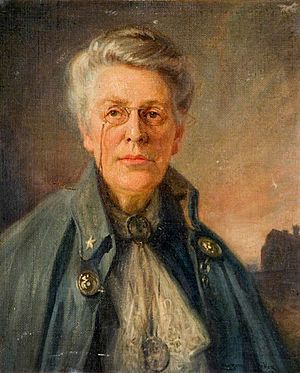Sophia Sturge facts for kids
Sophia Sturge (1849–1936) was a British woman who worked for peace and social change. She was a Quaker, a member of a Christian group known for its peaceful beliefs. Sophia also supported women's right to vote and spoke out against World War I.
Contents
Early Life and Work
Sophia Sturge was born in Edgbaston, Birmingham, England, on January 5, 1849. Her father, Joseph Sturge, was a Quaker who worked to end slavery. Sophia was taught at home. As she grew up, she decided to spend her life helping others and working for a better world.
Sophia was a pacifist, meaning she believed in solving problems without war. She thought women had a special role in making peace. During World War I, she worked with groups that opposed the war. She also helped people from other countries who were living in Britain during the war. After the war, she helped German children who were suffering.
Sophia was a leader in the Young British Women's Temperance Association. This group encouraged people to avoid alcohol. She also supported suffragism, the movement for women to get the right to vote.
Helping in Ireland
Sophia was very concerned about the poverty in Ireland. In 1888, she moved to Connemara, a poor area in Ireland. With help from other Quakers, she started a business there. It was a basket-making factory in the village of Letterfrack.
Sophia taught young girls how to weave baskets. This helped them learn a skill and earn money. The baskets were sold in Britain. Sophia lived in Ireland for seven years. She then returned to England because of her health. The factory continued to operate until 1905.
Working for Peace
By 1900, Sophia's main focus was peace. She went to many international meetings about peace. She was against the Second Boer War and supported campaigns to end it. She also joined the Union of Democratic Control. This group was formed in 1914 and opposed military influence in government.
Helping During World War I
When World War I started in August 1914, the British government began to detain people from enemy countries. Many had lived in Britain for years. Sophia was traveling when she saw long lines of Germans waiting to register as "enemy aliens." She realized they would need help.
Sophia wrote to a fellow Quaker, Stephen Hobhouse, with her idea. This led to Quakers setting up the "Friends' Emergency Committee." This committee helped Germans, Austrians, and Hungarians who were in trouble. They found jobs and homes for people who had lost them. They also gave money to families whose fathers had been called back to Germany to fight. Sometimes, they even helped people return to Germany.
Women's Peace Efforts
In December 1914, Sophia and other women reformers sent a letter to women in Germany and Austria. They asked them to join in calling for a truce. Later, women from the Netherlands suggested holding a Women's International Congress in The Hague.
Sophia was on the committee to organize British women's participation. Many British women wanted to go, but the British government stopped them. They were called unpatriotic in the newspapers. In the end, only three British women managed to attend the congress.
Later Life
After the war, Sophia went to the Netherlands. There, she helped German children who had been affected by the war. She also spoke at many British schools. She wrote books for children, including The Children of Hunger. This book was a collection of letters from children in Germany and Austria after World War I.
Over time, Sophia changed her religious views and joined the Church of England. However, she returned to the Quaker faith before she passed away on January 17, 1936.
 | Leon Lynch |
 | Milton P. Webster |
 | Ferdinand Smith |


